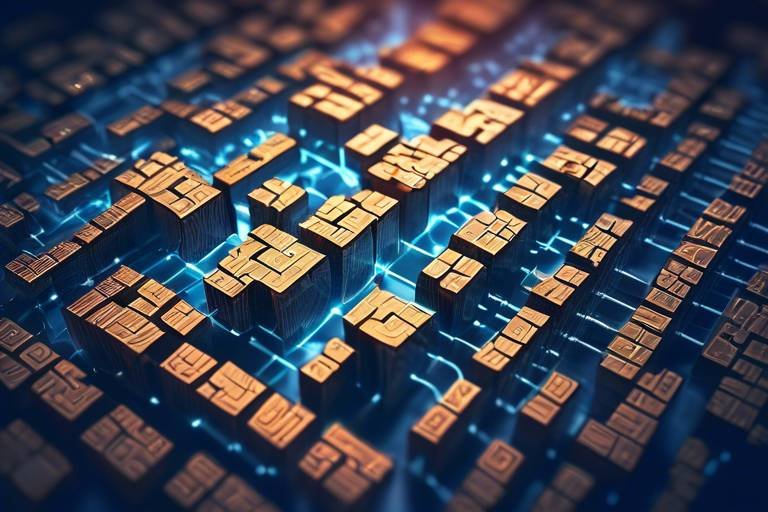How to Leverage Blockchain for Competitive Advantage
In today's fast-paced business landscape, staying ahead of the competition isn't just about having the best product or service; it's about leveraging technology to create a sustainable edge. One of the most revolutionary technologies making waves across industries is blockchain. But how can businesses truly harness its potential? This article dives deep into the strategic advantages of blockchain technology, exploring its impact on efficiency, security, and innovation. By the end, you'll have a clearer roadmap on how to leverage blockchain for competitive gain.
Before we delve into its advantages, let's break down what blockchain really is. At its core, blockchain is a decentralized and distributed digital ledger that records transactions across many computers. This means that once a transaction is recorded, it cannot be altered retroactively without the consensus of the network. Think of it as a digital notebook that everyone can see but no one can erase. This foundational principle of immutability and transparency lays the groundwork for its applications across various sectors, from finance to healthcare.
So, why should businesses care about blockchain? The benefits are numerous and can significantly enhance operational efficiency. Here are some key advantages:
- Transparency: With blockchain, all transactions are visible to authorized parties, fostering an environment of trust.
- Security: The decentralized nature of blockchain makes it inherently secure against hacks and fraud.
- Improved Traceability: Businesses can track their products throughout the supply chain, ensuring authenticity and reducing losses.
These advantages not only streamline operations but also enhance trust among stakeholders, which is crucial in today's interconnected world.
One of the standout features of blockchain is its ability to provide an immutable ledger that enhances transparency in transactions. This transparency fosters trust among stakeholders, reducing the potential for fraud and miscommunication. Imagine a world where every transaction is recorded and can be verified by anyone involved. This level of openness can significantly improve relationships with customers, suppliers, and partners.
Several companies have successfully implemented blockchain to improve transparency in their operations. For instance, Walmart uses blockchain technology to trace the origin of its food products, ensuring safety and quality. By scanning a product's QR code, customers can see its entire journey, from farm to shelf. This not only builds consumer trust but also allows for swift action in case of recalls.
However, achieving transparency through blockchain isn't without its challenges. Some businesses may struggle with the initial setup costs or the complexity of integrating blockchain with existing systems. To overcome these hurdles, companies can start with small pilot projects, gradually expanding as they become more comfortable with the technology. Education and training for staff are also crucial to ensure smooth adoption.
Blockchain can revolutionize supply chain management by providing real-time data access and traceability. Imagine a scenario where every participant in the supply chain can access the same information, reducing discrepancies and misunderstandings. This leads to not only reduced costs but also improved efficiency. For example, logistics companies can track shipments in real-time, allowing them to optimize routes and reduce delays.
Blockchain's versatility spans across various industries, showcasing its transformative potential. Here are a couple of innovative applications:
In the financial sector, blockchain is revolutionizing traditional banking through decentralized finance (DeFi) and smart contracts. These innovations allow for faster transactions, lower fees, and enhanced security. Imagine being able to send money across the globe in seconds without the need for intermediaries. This shift is not just a trend; it’s a fundamental change in how we perceive and handle finance.
Healthcare is another field ripe for disruption by blockchain technology. By enhancing patient data management and improving drug traceability, blockchain can streamline processes and lead to better outcomes. For instance, a patient’s medical history could be securely stored on a blockchain, allowing any authorized healthcare provider to access it instantly, thus improving the quality of care.
Q: What is blockchain?
A: Blockchain is a decentralized digital ledger that records transactions across multiple computers, ensuring that records cannot be altered retroactively.
Q: How can blockchain improve transparency?
A: Blockchain provides an immutable ledger of transactions that all authorized parties can view, fostering trust and reducing the potential for fraud.
Q: What industries can benefit from blockchain?
A: Industries such as finance, healthcare, logistics, and supply chain management can all leverage blockchain for improved efficiency and security.
Q: What are the challenges of implementing blockchain?
A: Challenges include initial setup costs, integration with existing systems, and the need for staff training and education.

Understanding Blockchain Technology
Blockchain technology, at its core, is a decentralized digital ledger that records transactions across multiple computers in such a way that the registered transactions cannot be altered retroactively. This concept may sound complex, but think of it as a digital notebook that everyone can see, but no one can erase. Each page in this notebook is a "block," and when a page fills up, a new one is added, creating a "chain" of pages—hence the name blockchain. This structure not only ensures security but also enhances transparency and trust among users.
The fundamental principles of blockchain revolve around three key components: decentralization, transparency, and immutability. In traditional systems, a central authority, like a bank or government, controls the transaction records. However, blockchain distributes this control across a network of computers, known as nodes. Each node has access to the entire chain, which means everyone can verify transactions independently. This decentralized nature reduces the risk of fraud and manipulation, making it a robust solution for various industries.
Another important aspect of blockchain is its transparency. Every transaction is recorded on the blockchain and is visible to all participants in the network. This visibility fosters a sense of accountability among users and significantly reduces the chances of fraudulent activities. Additionally, the immutability of blockchain means that once a transaction is added to the chain, it cannot be altered or deleted. This creates a permanent and unchangeable record, which is invaluable for industries that require rigorous auditing and compliance, such as finance and healthcare.
To better understand how blockchain operates, let's break down its structure:
| Component | Description |
|---|---|
| Block | A collection of transaction data, a timestamp, and a unique identifier called a hash. |
| Chain | A series of blocks linked together, where each block contains a hash of the previous block, ensuring integrity. |
| Node | A computer that participates in the blockchain network, maintaining a copy of the entire blockchain. |
| Consensus Mechanism | The protocol that nodes follow to agree on the validity of transactions, ensuring all copies of the blockchain are the same. |
In summary, understanding blockchain technology is essential for businesses looking to leverage its advantages. Its decentralized nature, coupled with transparency and immutability, provides a framework that can significantly enhance operational efficiency, security, and trust. As we delve deeper into the applications of blockchain across various sectors, it becomes clear that this technology is not just a passing trend but a fundamental shift in how we view and conduct transactions.

Benefits of Blockchain in Business
In today's fast-paced business landscape, organizations are constantly seeking ways to gain a competitive edge. One of the most promising technologies that have emerged in recent years is blockchain. This revolutionary technology offers a myriad of benefits that can significantly enhance business operations. From improving transparency to ensuring security, the advantages of blockchain can lead to increased efficiency and trust among stakeholders.
First and foremost, one of the standout benefits of blockchain is its ability to foster transparency. In a world where trust is paramount, the immutable nature of blockchain records ensures that all transactions are visible to authorized parties. This level of transparency not only builds trust among clients and partners but also reduces the potential for fraud. Imagine a scenario where every transaction is recorded in a public ledger that cannot be altered or deleted. This is the power of blockchain, and it can be a game-changer for businesses looking to establish credibility.
Moreover, blockchain enhances security in ways that traditional systems cannot. The decentralized nature of blockchain means that data is not stored in a single location, making it much harder for hackers to access sensitive information. Each transaction is encrypted and linked to the previous one, creating a chain that is incredibly difficult to tamper with. As a result, businesses can operate with greater confidence, knowing that their data is secure. This security extends beyond just financial transactions; it can protect intellectual property, personal data, and more.
Another significant advantage of blockchain is its ability to improve traceability. For industries such as supply chain management, this is particularly crucial. With blockchain, every step of a product's journey can be tracked and verified. This means businesses can ensure the authenticity of their products, monitor compliance with regulations, and quickly identify any issues that arise. For example, if a batch of food products is found to be contaminated, companies can trace back through the supply chain to identify the source of the problem swiftly.
To illustrate the benefits of blockchain further, let's take a look at a few key advantages in a table format:
| Benefit | Description |
|---|---|
| Transparency | Immutable records foster trust and reduce fraud potential. |
| Security | Decentralized data storage protects against unauthorized access. |
| Traceability | Improved tracking of products enhances compliance and quality control. |
While the benefits of blockchain are compelling, it’s essential to recognize that implementing this technology is not without its challenges. Businesses may encounter obstacles such as the need for significant changes in existing processes, potential resistance from employees, or the complexities of integrating blockchain with current systems. However, with the right strategies in place, these challenges can be effectively managed.
In conclusion, the advantages of blockchain technology are numerous and transformative. By enhancing transparency, security, and traceability, businesses can not only improve their operations but also build stronger relationships with their customers and stakeholders. As we delve deeper into the digital age, leveraging blockchain could very well be the key to unlocking a competitive advantage in an ever-evolving market.
- What is blockchain technology? Blockchain is a decentralized digital ledger that records transactions across multiple computers securely.
- How does blockchain enhance transparency? Blockchain provides an immutable record of transactions that can be viewed by authorized parties, fostering trust.
- Is blockchain secure? Yes, the decentralized nature and encryption methods used in blockchain make it highly secure against data breaches.
- Can blockchain improve supply chain management? Absolutely! Blockchain enhances traceability and accountability in supply chains, leading to better compliance and quality control.

Enhancing Transparency
When we talk about transparency in business, we're diving into a world where trust is paramount. Imagine a system where every transaction is recorded in an immutable ledger, visible to all authorized parties. This is precisely what blockchain technology offers. By leveraging blockchain, companies can create a transparent environment that not only fosters trust among stakeholders but also significantly reduces the potential for fraud. In a world where skepticism often reigns, this level of transparency can be a game-changer.
So, how does this work in practice? Each transaction on a blockchain is time-stamped and linked to the previous one, creating a chain of data that cannot be altered without consensus from the network. This means that once a record is added, it is virtually impossible to change or delete it. For businesses, this translates to a reliable audit trail that can be used to verify transactions, ensuring that all parties are on the same page. It’s like having a glass wall in a room filled with confidential discussions—everyone can see what's happening, which builds confidence and accountability.
Consider the supply chain as an example. In traditional systems, tracking the origin of a product can be a cumbersome process, often requiring multiple intermediaries. However, with blockchain, every step of the supply chain can be recorded on a single platform. This not only enhances visibility but also allows for real-time tracking of products. For instance, a consumer can scan a QR code on a product to see its entire journey from the farm to the store shelf. This level of detail not only empowers consumers but also encourages companies to maintain high standards throughout their operations.
However, while the benefits of transparency through blockchain are clear, there are also challenges to consider. Not all organizations are ready to adopt such a radical change. Some may struggle with the technical aspects of implementing blockchain, while others might face resistance from employees accustomed to traditional methods. To overcome these hurdles, businesses should invest in education and training, ensuring that all team members understand the value of transparency and how to leverage blockchain effectively.
In conclusion, enhancing transparency through blockchain is not just about adopting new technology; it's about fostering a culture of openness and accountability. As companies begin to recognize the value of this transformative technology, they will not only build trust with their customers and partners but also position themselves as leaders in their industries. The future is transparent, and blockchain is paving the way.
- What is blockchain technology? Blockchain is a decentralized digital ledger that records transactions across many computers in a way that the registered transactions cannot be altered retroactively.
- How does blockchain enhance transparency? By providing an immutable record of transactions that is accessible to all authorized parties, blockchain fosters trust and reduces the potential for fraud.
- What are some challenges of implementing blockchain? Challenges can include technical difficulties, resistance to change from employees, and the need for education and training.
- Can blockchain be used in any industry? Yes, blockchain has applications across various industries, including finance, healthcare, supply chain management, and more.

Case Studies of Transparency
In the rapidly evolving landscape of business, transparency has become a crucial factor for success. Companies are increasingly turning to blockchain technology to enhance their operational transparency, and several case studies illustrate just how powerful this tool can be. One notable example is Walmart, which has implemented blockchain to improve food traceability. By using IBM's Food Trust blockchain, Walmart can track the journey of food products from farm to store in real-time. This not only enhances consumer trust but also allows for quicker responses to food safety issues, significantly reducing the risk of contamination.
Another compelling case is that of Everledger, a company dedicated to improving transparency in the diamond supply chain. Everledger uses blockchain to create a digital ledger that records the provenance of diamonds, ensuring that customers can verify the ethical sourcing of their purchases. This initiative has not only built trust among consumers but also helped combat diamond fraud and conflict diamonds, showcasing the potential of blockchain in promoting ethical practices.
Moreover, the De Beers Group has adopted blockchain technology to track the authenticity and provenance of diamonds. Their platform, Tracr, provides a secure and immutable record of a diamond's journey, from the mine to the retailer. This transparency not only reassures consumers but also enhances the company's reputation, as buyers can be confident that their diamonds are conflict-free.
However, while these case studies highlight the benefits of blockchain for transparency, challenges exist. Companies must navigate issues such as data privacy, integration with existing systems, and the need for industry-wide collaboration to fully realize the potential of blockchain. Nevertheless, the success stories of Walmart, Everledger, and De Beers illustrate that with the right approach, businesses can leverage blockchain to foster a culture of transparency that builds trust and drives success.
In conclusion, the transformative power of blockchain in enhancing transparency is evident in these case studies. As more companies recognize the value of transparent operations, we can expect to see an increase in blockchain adoption across various sectors, paving the way for a more trustworthy and efficient business environment.
- What is blockchain technology? Blockchain is a decentralized digital ledger that records transactions across multiple computers, ensuring that the record cannot be altered retroactively.
- How does blockchain enhance transparency? By providing an immutable ledger, blockchain allows all stakeholders to view and verify transactions, reducing the potential for fraud and increasing trust.
- What are some challenges businesses face when implementing blockchain? Challenges include data privacy concerns, the need for industry collaboration, and integration with existing systems.
- Can blockchain be used in industries other than finance? Absolutely! Blockchain has versatile applications in various sectors, including supply chain management, healthcare, and real estate.

Challenges to Transparency
While blockchain technology offers remarkable advantages in enhancing transparency, it doesn't come without its fair share of challenges. One of the primary hurdles is the complexity of integration. Many businesses are already entrenched in traditional systems, and the transition to a blockchain-based model can be daunting. This shift requires not only financial investment but also a significant change in operational processes. How can a company ensure that all its stakeholders are on board with this change?
Another challenge lies in the data privacy concerns. Although blockchain is designed to be transparent, the nature of transparency can sometimes conflict with the need for confidentiality, especially in industries like healthcare or finance. Organizations must strike a balance between providing enough transparency to build trust while protecting sensitive information. This leads to the question: how can organizations maintain privacy without sacrificing transparency?
Moreover, there's the issue of scalability. As more transactions are added to a blockchain, the system can become slower and less efficient. This is particularly concerning for businesses that operate on a large scale or require real-time data. Finding a solution to this scalability problem is crucial for companies looking to fully leverage blockchain's potential. For instance, how can businesses ensure that their blockchain solutions can grow with their needs?
Lastly, the regulatory landscape surrounding blockchain is still evolving. Different jurisdictions have various regulations regarding data storage, privacy, and security. Companies must navigate these legal waters carefully to avoid non-compliance, which can lead to significant penalties. This raises the question: what steps can organizations take to ensure they remain compliant while implementing blockchain technology?
In summary, while the potential of blockchain to enhance transparency is immense, businesses must be prepared to face these challenges head-on. By understanding the complexities of integration, addressing data privacy concerns, tackling scalability issues, and staying compliant with regulations, organizations can successfully harness blockchain technology to foster greater transparency in their operations.
- What is blockchain technology? Blockchain is a decentralized digital ledger that records transactions across multiple computers in a way that the registered transactions cannot be altered retroactively.
- How does blockchain enhance transparency? Blockchain provides an immutable ledger that allows all parties involved in a transaction to view the same information, thereby reducing the chances of fraud and increasing trust.
- What are the main challenges in implementing blockchain? Key challenges include integration with existing systems, data privacy issues, scalability concerns, and navigating the regulatory landscape.
- Can blockchain be used in all industries? Yes, blockchain technology has the potential to transform various sectors, including finance, healthcare, logistics, and more, by enhancing transparency and efficiency.

Improving Supply Chain Management
In today's fast-paced business environment, efficiency and transparency are paramount, especially in supply chain management. Blockchain technology emerges as a game-changer, providing businesses with the tools they need to revolutionize their supply chains. Imagine a world where every transaction, from production to delivery, is recorded on an immutable ledger that everyone can trust. This is not just a dream; it's the reality that blockchain brings to the table.
One of the most significant advantages of using blockchain in supply chain management is its ability to offer real-time data access. This means that all parties involved in the supply chain—from manufacturers to retailers—can see the same information at the same time. No more waiting for reports or worrying about discrepancies; everyone is on the same page. This level of transparency not only enhances communication but also fosters a sense of collaboration among stakeholders.
Moreover, blockchain enhances traceability. Every product can be tracked from its origin to its final destination, allowing businesses to pinpoint where delays or issues occur. For instance, if a batch of goods is compromised, companies can quickly identify the source and take corrective action. This capability is invaluable in industries like food and pharmaceuticals, where safety and compliance are critical. By implementing blockchain, companies can effectively reduce the risk of fraud and errors, leading to improved customer trust and satisfaction.
To illustrate this, let’s consider a hypothetical scenario: a major food retailer using blockchain to trace the journey of its products. When a customer scans a QR code on a packaging, they can see the entire supply chain journey of that product, from farm to store. This not only enhances customer trust but also empowers consumers to make informed choices about the products they purchase.
However, while the benefits are substantial, businesses must also navigate some challenges when integrating blockchain into their supply chain processes. Issues such as scalability, interoperability, and the need for industry-wide standards can pose significant hurdles. Companies must invest in the right technology and collaborate with other players in their industry to create a cohesive blockchain ecosystem. Strategies such as pilot programs and phased implementations can help mitigate these challenges. By starting small and gradually expanding, businesses can refine their processes and build confidence in the technology.
In conclusion, blockchain technology holds immense potential to improve supply chain management. With its ability to enhance transparency, provide real-time data access, and improve traceability, businesses can significantly streamline their operations. As companies continue to explore the possibilities of blockchain, those who embrace this technology early on will likely gain a competitive edge in the market.
- What is blockchain technology? - Blockchain is a decentralized digital ledger that records transactions across multiple computers in a secure and immutable way.
- How does blockchain improve supply chain management? - It enhances transparency, traceability, and real-time data access, allowing businesses to operate more efficiently.
- What are the challenges of implementing blockchain in supply chains? - Challenges include scalability, interoperability, and the need for industry standards.
- Can blockchain be used in any industry? - Yes, blockchain has applications across various sectors, including finance, healthcare, and logistics.

Innovative Use Cases of Blockchain
Blockchain technology is not just a buzzword; it’s a revolutionary force that is reshaping industries across the globe. Its innovative use cases extend far beyond cryptocurrency, bringing transformative changes to sectors like finance, healthcare, logistics, and beyond. Imagine a world where transactions are not only faster but also more secure and transparent. This is the reality that blockchain is creating, and it’s exciting to explore its potential.
In the financial sector, blockchain is making waves with the emergence of decentralized finance (DeFi), which allows individuals to access financial services without the need for traditional banks. This democratization of finance is akin to giving power back to the people, enabling them to lend, borrow, and trade assets in a peer-to-peer environment. Smart contracts, self-executing contracts with the terms of the agreement directly written into code, further enhance this ecosystem by automating processes and reducing the need for intermediaries. This not only speeds up transactions but also minimizes the risk of fraud.
Healthcare is another industry where blockchain is proving to be a game-changer. With the ability to securely store and share patient data, blockchain enhances data management and privacy. Imagine a scenario where your medical history is not only accessible to you but also verified and immutable, ensuring that healthcare providers have the most accurate information at their fingertips. Moreover, blockchain can improve drug traceability, combating counterfeit medications and ensuring that patients receive genuine products. This can lead to better health outcomes and increased trust in healthcare systems.
Logistics and supply chain management are also reaping the benefits of blockchain technology. With its ability to provide real-time data access and traceability, businesses can streamline their operations, reduce costs, and improve efficiency. For instance, companies can track the movement of goods from the manufacturer to the retailer, ensuring that every step is transparent and accountable. This level of visibility not only enhances operational efficiency but also builds consumer trust. Imagine being able to verify the origin of your food or the authenticity of luxury goods with just a few clicks.
Here’s a quick overview of some innovative use cases of blockchain technology:
| Industry | Use Case | Benefits |
|---|---|---|
| Finance | Decentralized Finance (DeFi) | Increased access to financial services, reduced reliance on banks |
| Healthcare | Patient Data Management | Enhanced privacy and data security, improved patient outcomes |
| Logistics | Supply Chain Transparency | Real-time tracking, reduced fraud, increased consumer trust |
| Real Estate | Property Transactions | Faster transactions, reduced paperwork, enhanced security |
As we look to the future, the possibilities for blockchain are virtually limitless. Industries that embrace this technology will not only gain a competitive edge but will also contribute to creating a more transparent and efficient world. The question remains: are you ready to leverage blockchain for your business? With its potential to revolutionize operations and foster innovation, the time to act is now.
- What is blockchain technology? Blockchain is a decentralized digital ledger that records transactions across many computers, ensuring that the recorded transactions cannot be altered retroactively.
- How does blockchain enhance security? Blockchain uses cryptography to secure data, making it nearly impossible for unauthorized parties to alter or hack the information stored on the blockchain.
- Can blockchain be used in industries other than finance? Absolutely! Blockchain has applications in various sectors including healthcare, logistics, real estate, and even voting systems.
- What are smart contracts? Smart contracts are self-executing contracts with the terms directly written into code, allowing for automatic execution of agreements when conditions are met.
- Is blockchain technology environmentally friendly? While some blockchain networks consume significant energy, newer technologies and consensus mechanisms are being developed to reduce environmental impact.

Blockchain in Finance
Blockchain technology is shaking up the financial sector like a refreshing breeze on a hot summer day. Imagine a world where transactions are not only faster but also more secure and transparent. This is the promise that blockchain brings to finance. At its core, blockchain is a decentralized ledger that records transactions across multiple computers, ensuring that the data is immutable and accessible to all authorized parties. This means that once a transaction is recorded, it cannot be altered or deleted, offering a level of security that traditional systems simply can't match.
One of the most exciting developments within the realm of finance is the rise of Decentralized Finance (DeFi). DeFi leverages blockchain technology to recreate and improve upon traditional financial systems, such as lending, borrowing, and trading, but without the need for intermediaries like banks. This not only reduces costs but also democratizes access to financial services, enabling anyone with an internet connection to participate. Think of it as taking the power away from the banks and putting it back into the hands of the people.
Furthermore, blockchain's smart contracts are another game-changer. These are self-executing contracts with the terms of the agreement directly written into code. This means that once the conditions are met, the contract automatically executes without the need for a middleman. For example, imagine a scenario where you want to purchase a house. With a smart contract, the transfer of ownership and funds can happen simultaneously, eliminating the risk of fraud and ensuring a seamless transaction. It's like having a digital notary that works 24/7, ensuring everything goes smoothly.
But let's not forget about transaction security. Traditional financial transactions can be prone to fraud, identity theft, and data breaches. However, with blockchain, every transaction is encrypted and linked to the previous transaction, creating a chain of blocks that is incredibly difficult to tamper with. This provides a level of security that can significantly reduce the risk of fraudulent activities. In fact, a recent study indicated that financial institutions implementing blockchain technology saw a 50% reduction in fraud-related losses.
| Benefit | Description |
|---|---|
| Cost Reduction | Lower transaction fees by eliminating intermediaries. |
| Increased Security | Enhanced protection against fraud through encryption. |
| Faster Transactions | Real-time processing of transactions without delays. |
| Global Accessibility | Access to financial services from anywhere in the world. |
As we continue to see blockchain's impact on the financial sector, it's clear that the technology is not just a passing trend; it's a fundamental shift in how we think about money and transactions. The possibilities are endless, and while there are challenges to overcome, such as regulatory hurdles and public perception, the potential rewards make it a space worth watching. So, whether you're a seasoned investor or just curious about the future of finance, keep an eye on blockchain—it might just be the key to unlocking a new era of financial innovation.
- What is blockchain technology?
Blockchain is a decentralized digital ledger that records transactions across multiple computers, ensuring that the data is secure and immutable. - How does blockchain improve financial transactions?
It enhances security, reduces costs by eliminating intermediaries, and speeds up the transaction process. - What are smart contracts?
Smart contracts are self-executing contracts with the terms of the agreement directly written into code, allowing for automated execution when conditions are met. - What is decentralized finance (DeFi)?
DeFi refers to financial services that are built on blockchain technology, allowing users to lend, borrow, and trade without intermediaries.

Blockchain in Healthcare
When we think about healthcare, the first thing that often comes to mind is the immense amount of data generated every second. With millions of patient records, treatment histories, and medication logs, the industry faces significant challenges in managing this information securely and efficiently. Enter blockchain technology, a game-changer that promises to revolutionize how we handle healthcare data. Imagine a world where patient information is not only secure but also easily accessible to authorized personnel without the risk of tampering. That’s the power of blockchain!
Blockchain operates on a decentralized network, which means that instead of having a single point of failure, data is distributed across multiple nodes. This feature enhances security and trust in the healthcare sector. For instance, when a patient visits a doctor, their medical history can be verified instantly through a blockchain ledger, ensuring that the right treatment is administered based on accurate and up-to-date information. This not only reduces the chances of medical errors but also improves the overall quality of care.
One of the most exciting applications of blockchain in healthcare is the management of patient data. Traditionally, patient records are stored in silos across various healthcare providers, making it difficult to access comprehensive medical histories. With blockchain, a patient's entire medical history can be recorded in a secure, immutable ledger that is accessible to all authorized healthcare providers. This seamless flow of information can lead to better-informed decisions, quicker diagnoses, and ultimately, improved patient outcomes.
Moreover, blockchain can significantly enhance drug traceability. The pharmaceutical industry has long struggled with issues like counterfeit medications and supply chain inefficiencies. By utilizing blockchain, every step of a drug's journey—from production to distribution—can be recorded and verified. This transparency not only helps in tracking the authenticity of medications but also ensures compliance with regulatory standards. Patients can rest assured that the medication they receive is legitimate and safe.
However, the integration of blockchain in healthcare is not without its challenges. Issues such as interoperability between different systems, the need for standardized protocols, and the initial costs of implementation can pose significant hurdles. Nevertheless, many experts believe that the long-term benefits of adopting blockchain far outweigh these initial challenges. To overcome these obstacles, stakeholders in the healthcare sector must collaborate and innovate, developing solutions that ensure smooth integration and widespread adoption.
In conclusion, the potential of blockchain in healthcare is vast and transformative. By enhancing data security, improving patient data management, and increasing drug traceability, blockchain technology is paving the way for a more efficient and trustworthy healthcare system. As we continue to explore its applications, one thing is clear: the future of healthcare is not only digital but also decentralized.
- What is blockchain technology? Blockchain is a decentralized digital ledger that records transactions across many computers in a way that the registered transactions cannot be altered retroactively.
- How does blockchain enhance patient data security? By storing data in a decentralized manner, blockchain protects patient information from unauthorized access and tampering, ensuring that only authorized personnel can view or modify the data.
- Can blockchain improve drug traceability? Yes, blockchain provides a transparent and immutable record of every transaction in the supply chain, making it easier to verify the authenticity of medications and track their journey from manufacturer to patient.
- What challenges does blockchain face in healthcare? Challenges include interoperability issues, the need for standardized protocols, and the initial costs of implementation, which can be significant for healthcare providers.
Frequently Asked Questions
- What is blockchain technology?
Blockchain technology is a decentralized digital ledger that records transactions across multiple computers. This ensures that the recorded transactions cannot be altered retroactively, providing a secure and transparent way to track assets and information.
- How does blockchain enhance transparency in business?
Blockchain enhances transparency by providing an immutable ledger that all stakeholders can access. This means every transaction is recorded and visible, which helps build trust among parties and reduces the risk of fraud.
- What are the main benefits of using blockchain in supply chain management?
Using blockchain in supply chain management offers several benefits, including improved traceability of products, real-time data access, and reduced costs. It allows businesses to track their products from origin to destination, ensuring accountability and efficiency.
- Can blockchain technology be applied in healthcare?
Absolutely! Blockchain can revolutionize healthcare by enhancing patient data management, improving drug traceability, and streamlining processes. This can lead to better patient outcomes and a more efficient healthcare system.
- What challenges might businesses face when implementing blockchain?
Businesses may encounter challenges such as integration with existing systems, regulatory compliance, and the need for employee training. However, with strategic planning and investment in education, these challenges can be effectively managed.
- Is blockchain technology secure?
Yes, blockchain technology is considered secure due to its decentralized nature and cryptographic principles. Once a transaction is recorded, it is nearly impossible to alter or delete, which significantly enhances security against fraud.
- How can small businesses leverage blockchain for competitive advantage?
Small businesses can leverage blockchain by adopting it for secure transactions, improving transparency with customers, and enhancing supply chain efficiency. This can help them compete with larger companies by building trust and reducing operational costs.



















